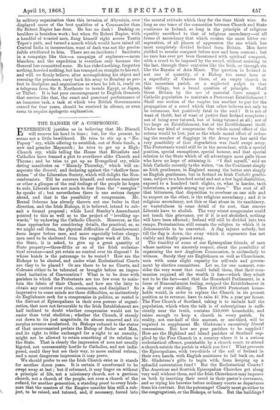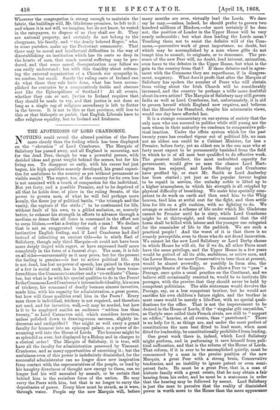THE DANGER OF A COMPROMISE.
EXPERIENCE justifies us in believing that Mr. Disraeli will recover his head in time ; but, for the present, he seems not a little bewildered. He tries to stir up a " No-
Popery " cry, while offering to establish, out of State funds, a new and grander Alaynooth ; he tries to get up a High- Church cry, while telling the House that Ritualists and Catholics have framed a plot to overthrow alike Church and Throne ; and he tries to get up an Evangelical cry, while dating manifestos on "Maundy Thursday," which will ex- asperate the Record; and declaring against the "shallow fana- ticism " of the Liberation Society, which will delight the Non- conformists. Till he recovers himself, and catches somehow or other a glimpse of the real feelings of the people he hopes to rule, Liberals have not much to fear from the " energies " he speaks of ; but nevertheless there is one serious danger ahead, and that is the possibility of compromise. Mr. Bernal Osborne has already thrown out one feeler in that direction, and the Irish Bishops, it is believed, intend to sub- mit a formal proposal ; while Lord Stanley's Amendment pointed to this as well as to the project of " levelling up- wards," by endowing the Catholic Church. Moreover, as the time approaches for considering details, the practical, or, as we might call them, the physical difficulties of disendowment loom larger before men, and more especially before clergy- men used to be sheltered from the rougher work of life. Is the State, it is asked, to give up a great quantity of _State property—three-fifths or so of the Irish ecclesias- tical revenue—and yet retain no control over its disposal ? In whose hands is the patronage to be vested ? How are the Bishops to be elected, and under what Ecclesiastical Courts are they to be placed ? Or are there to be no Courts, and Colensos either to be tolerated or brought before an impro- vized imitation of Convocation ? What is to be done with parishes in which the Protestants are too few even to main- tain the fabric of their Church, and how are the laity to obtain any control over rites, ceremonies, and discipline ? So impressive to some minds are these difficulties, so instinctively do Englishmen seek for a compromise in politics, so rooted is the distrust of Episcopalians in their own powers of organi- sation, that men not favourable to the Irish Establishment are half inclined to doubt whether compromise would not be easier than total abolition ; whether the Church, if sternly cut down to its just magnitude, its abuses removed and its surplus revenue secularized, its Bishops reduced to the status of that uncovenanted prelate the Bishop of Sodor and Man,
and its right to tithe exchanged for a right to an annuity, might not be allowed to retain something of its relation to
the State. That is clearly the impression of men not usually bigoted, not unreasonably hostile to Catholics, and not indis- posed, could they but see their way, to more radical reform, and a most dangerous impression it may prove.
We should prefer to see the Irish Church exist as it stands for another dozen years. It is certain if unreformed to be swept away at last ; but if reformed, it may linger on without
a principle of life, not a missionary church, not a garrison church, not a church of the people, not even a church of the refined, for another generation, a standing proof to every Irish- man that the masters of the Empire consider him still a sub- ject, to be raised, and tutored, and, if necessary, forced into
the mental attitude which they for the time think wise. So long as one trace of the connection between Church and State continues in Ireland, so long is the principle of religious equality sacrificed to that of religious ascendancy—of all forms of ascendancy that which creates the most bitter ex- asperation, of all phases of oppression the one which has most completely divided Ireland from Britain. Men have yielded to secular conquest before now and been content ; but no race has ever yet been threatened with spiritual conquest, with a creed to be imposed by the sword, without resisting to the last, through three centuries like the Irish, or through six like the Rayahs of Asia Minor. The question in Ireland is not one of quantity, of a Bishop too many here or a superfluity of Canons there, of an empty church in this mountain parish, or a neglected pulpit in that
lake village, but a broad question of principle. Shall Great Britain by the use of material force compel a Catholic population to maintain a Protestant Establishment ? Shall one section of the empire tax another to pay for the propagation of a creed which that other believes not only to be erroneous, but positively fatal to the soul ? It is not of want of thrift, but of want of justice that Ireland complains ; not of being over tutored, but of being tutored at all ; not of too large an Establishment, but of the Establishment itself. Under any kind of compromise the whole moral effect of the reform would be lost, just as the whole moral effect of reduc- ing the number of floggings in the Army was lost until the very possibility of that degradation was itself swept away. The Protestants would still be in the ascendant, with a special position, special exemptions, special honour, and that special relation to the State which of all advantages most galls those who have no hope of attaining it. "I find myself," said an Irish Catholic recently to the writer, "on the Continent simply an Irish gentleman, in England among the better sort simply an English gentleman, but in Ireland an Irish Catholic gentle- man, subject to a hundred social and not a few legal disabilities, exposed to a hundred tacit slights, or, what is harder, tacit tolerations, a pariah among my own class." The root of all that bitterness, that disposition to overbear on one side and to suspect on the other, is the religious ascendancy ; and it is religious ascendancy, not this or that abuse in its machinery, or wastefulness in some detail of its cost, that sincere Liberals have to abolish. The very wisest compromise could not touch this grievance, yet if it is not abolished, nothing will have been effected ; Ireland will still be divided into two camps, Protestantism still remain the religion to which it is dishonourable to be converted. A flag injures nobody, but till the flag is down, the sway which it represents has not visibly and finally passed away.
The timidity of some of our Episcopalian friends, of men whose motives we sincerely respect, about the possibility of organizing the new Anglican Communion, is melancholy to witness. Surely they are Englishmen as well as Churchmen, men with some slight capacity for self-rule and govern- ment by elective committees. Let us, for one moment, con- sider the very worst that could befall them, that their com- munion required all the wealth it has—which they admit
not to be the fact—and that the Household Parliament, in a furor of Nonconformist feeling, stripped the Establishment in a day of every shilling. Then 120,000 Protestant house-
holds would, in order to replace the Church in its present position as to revenue, have to raise 4/. 10s. a year per house. The Free Church of Scotland, taking it to include half the population, which when the talk is of subscriptions is suffi- ciently near the truth, contains 350,000 households, and raises enough to keep a church in every parish. In reality, not one-half of this amount, or one-third, will be required to supplement Mr. Gladstone's excessively liberal concessions. But how are poor parishes to be supplied ?
How are the Highland and island parishes of Scotland sup- plied by the Free Church in a country where it is a serious ecclesiastical offence, punishable by a church court, to attend
a church outside the parish in which you live ? What prevents the Episcopalians, with two-thirds of the soil of Ireland in their own hands, with English assistance to fall back on, and Mr. Gladstone's gifts to begin with, from keeping up a splendid sustentation fund ? But the Ecclesiastical Courts ?
The American and Scottish Episcopalian Churches get along very well without them, and the Irish Churchmen may improve
on both by inserting their creed in their pastor's covenants, and so trying his heresies before ordinary courts as departures from his contract. But the patronage? Clearly must go either to the congregatiois, or the Bishops, or both. But the buildings V
Wherever the congregation is strong enough to maintain the fabric, the buildings will, Mr. Gladstone promises, be left to it ; and where it is not will, we imagine, but do not know, be vested in the ratepayers, to dispose of as they shall see fit. They are national property, and certainly do not belong to the clergyman, his family, and " the dearly beloved Roger," who, in some parishes, make up the Protestant community. That there may be moral and intellectual difficulties in the way of disestablishing an institution which has its roots so deep in the hearts of men, that much mental suffering may be pro- duced, and that some moral disorganization may follow we can easily understand ; but with this timidity about refram- ing the external organization of a Church our sympathy is, we confess, but small. Surely the ruling caste of Ireland can do what those they rule have done, what has been accom- plished for centuries by a comparatively feeble and obscure sect like the Episcopalians of Scotland ? At all events, whether they can or not, justice to Ireland requires that they should be made to try, and that justice is not done so long as a single rag of religious ascendancy is left to flutter in the breeze. It is not to this or that province, still less to this or that bishopric or parish. that English Liberals have to offer religious equality, but to Ireland and Irishmen.































 Previous page
Previous page